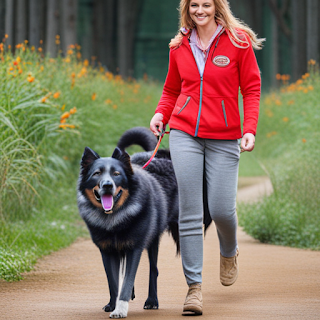My Dog Suffers With Separation Anxiety
How A Dog Acts Because Of Separation Anxiety
If you're a dog owner, you may have heard of separation anxiety in dogs. This is a condition where your furry friend becomes anxious when left alone, leading to destructive behavior like chewing or digging. But don't worry, there are ways to help your pup feel more comfortable when you're away. One solution is to gradually increase the time you spend away from your dog, starting with short intervals and building up to longer periods. Another option is to provide your dog with plenty of toys and treats to keep them occupied while you're gone. Remember, with a little patience and understanding, you can help your dog overcome separation anxiety and feel more at ease when you're not around.
Separation anxiety is a condition in dogs where they become distressed and anxious when separated from their owners or left alone. This can result in destructive behavior, excessive barking, and other unwanted behaviors.
Dogs with separation anxiety can exhibit a variety of behaviors that are indicative of their distress. They may become extremely anxious and restless when their owner is preparing to leave the house, and may follow their owner around the house in an attempt to prevent them from leaving. Once their owner has left, these dogs may engage in destructive behaviors such as chewing on furniture or other objects, or they may urinate or defecate in inappropriate places. Some dogs may bark or howl incessantly, while others may become withdrawn and refuse to eat or drink. These behaviors can be distressing for both the dog and their owner, and it is important to seek help from a veterinarian or animal behaviorist if your dog is exhibiting symptoms of separation anxiety.
There is no conclusive evidence showing exactly why dogs develop separation anxiety. However, because far more dogs who have been adopted from shelters have this behavior problem than those owned since puppy hood, it is believed that loss of an important person or group of people in a dog’s life can lead to separation anxiety. Other less dramatic changes can also trigger the disorder. The following are some situations that have been associated with development of separation anxiety.
So you've got a new dog and they're experiencing separation anxiety? Don't worry, it's actually pretty common. Your pup just needs some time to adjust to their new surroundings and get comfortable being alone. In the meantime, try leaving them with a special toy or treat that they only get when you're gone. You can also practice leaving for short periods of time and gradually increasing the duration. Remember to be patient and give your furry friend lots of love and attention when you're together!
Change of Owners
Being abandoned, surrendered to a shelter or given to a new guardian or family can trigger the development of separation anxiety.
A Sudden Change of schedule
An abrupt change in schedule in terms of when or how long a dog is left alone can trigger the development of separation anxiety.
Change of Residence
Moving to a new residence can trigger the development of separation anxiety.
Change of household members
The sudden absence of a resident family member, either due to death or moving away, can trigger the development of separation anxiety.
Separation Anxiety is a common issue that many pet owners face, but the good news is that there are ways to help your furry friend feel more comfortable when you're not around. Separation anxiety can manifest in different ways, such as excessive barking, destructive behavior, or even potty accidents. One effective approach is to gradually get your dog used to being alone by starting with short periods of time and gradually increasing the duration. You can also provide them with toys or treats to keep them occupied while you're away. Remember to always show your dog love and patience, and don't hesitate to seek professional help if the problem persists. With a little bit of effort and understanding, you can help your dog overcome separation anxiety and enjoy a happier, healthier life.
See Also




